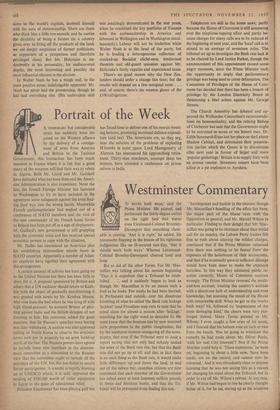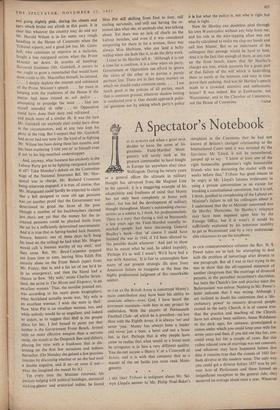Westminster Commentary
But so did all the other Tories. For Mr: Mac- millan was talking about his motion beginning 'That it is expedient that a Tribunal be estab- lished . . .', and it suddenly began to look as though Mr. Macmillan is by no means such a fool as he looks. For weeks he had been harried, in Parliament and outside,. over his disastrous fumbling of what he called 'the Bank rate leakage \ncidene (and Freudians may care to note that he stood silent for almost a minute after 'leakage,' searching for the right word to describe it). He must know that the business has by now assumed such proportions in the public imagination, fed by the assiduous rumour-mongering of the news- papers, that even if, the Tribunal were to issue a report saying that not only had nobody leaked the news of the Bank rate rise, but that the Bank rate did not go up at all, and that in fact there is no such thing as the Bank rate, it would make little difference; up and down the land, in and out of the saloon bar, countless citizens are now convinced that each member of the Government has salted away at least fourteen million pounds in Swiss and Mexican banks, and that the Tri- bunal will be prevented from finding this out. Incompetent and foolish in the extreme though Mr. Macmillan's handling of the affair has been, the major part of the blame rests with the Opposition in general, and Mr. Harold Wilson in particular. Finding to their delight that Mf. Mac- millan was going to be obstinate about their initial call for an inquiry, the Labour Party leaders felt free to rush about uttering the wildest charges, convinced that if the Prime Minister remained firm there was nothing to be feared from the exposure of the hollowness of their accusations, and that if he eventually gave in sufficient damage would have been done to make the exposure harmless. In this way they estimated public re- action correctly, House of Commons reaction wrongly. The Prime Minister reversed the profit- and-loss account, treating the country's attitude with a disastrous lack of understanding and even knowledge, but assessing the mood of the House with remarkable skill. When he got to the 'works both ways' bit, followed by 'imputations of the most damaging kind,' the cheers were very pro- longed indeed. Many Tories pointed at Mr. Wilson; I even caught a few cries of his name, and I fancied that his bottom rose an inch or two from the bench. Was he going to withdraw the remarks he had made -about Mr. Oliver Poole, 'with his vast City interests'? Not if the Prime Minister could help it. 'These statements,' he went on, beginning to shout a little now, 'have been made, are on the record, and cannot now be retracted.' And it was abundantly clear to anyone listening that he was not saying this as a reason for changing his mind about the Tribunal, but in order to cut off Mr. Wilson's retreat. At any rate, if Mr. Wilson had begun to rise he clearly thought better of it, for he sat, staring up at the windows and going slightly pink, during the cheers and jeers which broke out afresh at this point. It is clear that whatever the country may do and say Mr. Harold Wilson is in for some very rough handling in the House of Commons when the Tribunal reports, and a good job too. Mr. Gaits- kell, who continues to improve as a tactician, fought a fine rearguard action when the Prime Minister sat down. In accents of humbug- flavoured fruitiness (Mr. Gaitskell, it occurs to me, ought to grow a moustache) that would have done credit to Mr. Macmillan himself, he•intoned, • • . 1 deeply deplore the manner and substance of the Prime Minister's speech . . . far more in keeping with the traditions of the House if the matter had been treated as sub judice . . . attempting to prejudge the issue . . . had not myself intended to refer . . . no Opposition could have done their duty and refrained . . and much more of a similar ilk. It was the best Mr. Gaitskell (or anybody else) could have done in the circumstances, and at any rate kept his Party in the ring. But I suspect that Mr. Gaitskell had never had any taste for the kind of in-fighting Mr. Wilson has been doing these last months, and has been muttering 'I told you so' to himself even if not to his big-mouthed understrapper.
And, anyway, what business has anybody in the Labour Party got to be fighting rearguard actions at all? Take Monday's debate on the Committee stage of the National Insurance Bill. Mr., Mar- quand was in charge, Mr. Richard Crossman being otherwise engaged; it is true, of course, that Mr. Marquand could hardly be expected to claim that a Bill designed to raise old age pensions was yet another proof that the Government was determined to grind the faces of the poor (though a number of his backbenchers claimed just that), nor yet that the money for the in- creased: pensions could be plucked forth from the air by a sufficiently determined necromancer. And it is true that in Spring-heeled Jack (bounce, bounce, bounce; one of these days he'll bang his head on the ceiling) he had what Mr. Magoo would call 'a foeman worthy of my steel,' and then some. But, Mr. Boyd-Carpenter popped out from time to time, leaving Miss Edith Pitt entirely alone on the Front Bench (apart from Mr. Finlay, that is, and a fat lot of use he'd be in an emergency), and then the blood had a chance to flow. 'My wife,' wrote Charles Strick- land, the artist in The Moon and Sixpence, 'is an excellent woman.' That, the novelist pointed out, was according to his more pious biographers; what Strickland actually wrote was, 'My wife is an excellent woman; I wish she were in Hell.' Now Miss Pitt is an excellent woman, too, and while nobody would be so ungallant, and indeed so unjust, as to suggest that Hell is the proper place for her, I feel bound to point out that neither is the Government Front Bench. Armed with no more effective weapon than a nervous smile, she stands at the Despatch Box and dithers, playing for time with a frankness that is dis- arming on the first few occasions and tedious thereafter. (On Monday she gained a few precious minutes by discussing whether or no she had used a double negative, and if so—or even if not— what she imagined she meant by it.) Yet every time the Minister returned, his Pockets bulging with political bandages, statistical sticking-plaster and oratorical iodine, he found Miss Pitt still shifting from foot to foot, still smiling nervously, and 'still not having the re- motest idea what she, or anybody else, was talking about. Yet there was no lack of churls on the Labour benches, and even if it was considered unsporting for them to hit a woman, there was always Miss Herbison, who can land a hefty wallop when she feels like it, to do the dirty work.
Listen to Sir. Hartley tell it : 'Although it is not a time for a coalition, it is a time when no party, Government or Opposition can afford to ignore the views of the other or to pursue a purely partisan line. There are in fact many matters on which we should make common cause. . . . I see much good in the policies of all parties, much that is common ground, whatever shadow boxing is conducted over it. One should approach politi- cal questions• not by asking which party's policy it is but what the policy is, not who is right but what is right.. .
Now Sir Hartley can doubtless plod through his own Wanderjahre without any help from me; and his role in the wire-tapping affair was not exactly calculated to make me clap my hands and call him Master: But as an indictment of his colleagues that passage would be hard to beat. And it is the fact that enough of them, at any rate on the front bench, know that Sir Hartley's charges are true, which accounts for a great part of that failure of the will which is bedevilling them so sorely at the moment, and may in time prove their undoing. And was Sir Hartley's speech made to a crowded, attentive and enthusiastic house? It was indeed. But at Eastbourne, not Westminster, and to the Chamber of Commerce,











































































 Previous page
Previous page